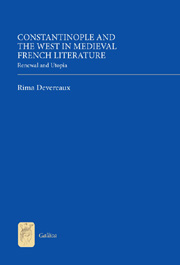Book contents
- Frontmatter
- Contents
- List of illustrations
- Dedication
- Acknowledgements
- List of abbreviations
- Note to the reader
- Introduction
- Part I Renewal and Utopia: The Terms of the Debate
- 1 Making Sense of History: East–West Relations and the Idea of the City in the Twelfth and Thirteenth Centuries
- 2 Renewal and Utopia: Two Paradigms for Understanding East–West Relations in Medieval French Texts
- Part II Constantinople Desired
- Part III The Renovatio of the West
- Conclusion
- Appendix 1 Original Latin Quotations
- Appendix 2 References to Constantinople in Other Epics and Romances
- Appendix 3 Outline of Events in the History of East–West Relations from the Second Crusade to the Palaeologan Reconquest
- Bibliography
- Index
- Already Published
2 - Renewal and Utopia: Two Paradigms for Understanding East–West Relations in Medieval French Texts
from Part I - Renewal and Utopia: The Terms of the Debate
Published online by Cambridge University Press: 05 February 2013
- Frontmatter
- Contents
- List of illustrations
- Dedication
- Acknowledgements
- List of abbreviations
- Note to the reader
- Introduction
- Part I Renewal and Utopia: The Terms of the Debate
- 1 Making Sense of History: East–West Relations and the Idea of the City in the Twelfth and Thirteenth Centuries
- 2 Renewal and Utopia: Two Paradigms for Understanding East–West Relations in Medieval French Texts
- Part II Constantinople Desired
- Part III The Renovatio of the West
- Conclusion
- Appendix 1 Original Latin Quotations
- Appendix 2 References to Constantinople in Other Epics and Romances
- Appendix 3 Outline of Events in the History of East–West Relations from the Second Crusade to the Palaeologan Reconquest
- Bibliography
- Index
- Already Published
Summary
In Chapter 1 I outlined the implications of the concepts of renewal and utopia for an analysis of the relationship between the West and Constantinople in medieval texts. These concepts can be seen to be elaborated in two fictional texts probably produced in the third quarter of the twelfth century, the Eracle of Gautier d'Arras and the Pèlerinage de Charlemagne. Both of these texts bring into play two motifs: the relics motif, narrating the renewal of a city or cities through the involvement of its ruler in the translation of relics from Jerusalem; and the rivalry motif, recounting the defeat of an enemy city. These motifs enable the ruler's relationship with spiritual authority to be achieved and maintained, and shed light on the nature of kingly authority and power. The different ways in which the two texts exploit these motifs exemplify the distinction between renewal and utopia in the literary presentation of East–West relations. By exploring these motifs i aim to lay the groundwork for future discussion by establishing the two paradigms according to which East–West relations can be understood in medieval French texts. By examining the texts' generic status, and looking at traditions about the emperor heraclius and the legend of Charlemagne's journey to the orient, I aim to locate better the originality and purpose of the texts' representation of East–West relations.
- Type
- Chapter
- Information
- Constantinople and the West in Medieval French LiteratureRenewal and Utopia, pp. 36 - 72Publisher: Boydell & BrewerPrint publication year: 2012



